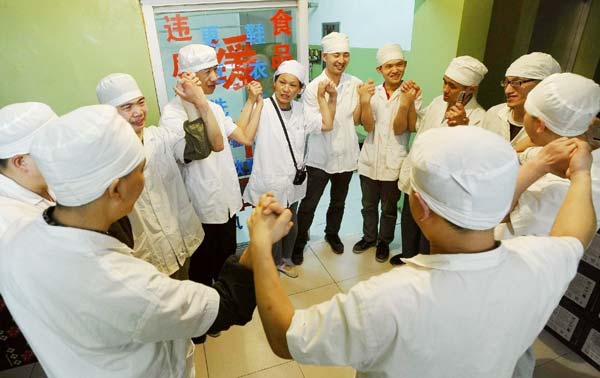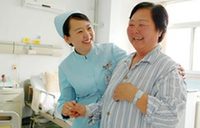Factory of dreams
 |
|
Yi works hand in hand with her employees to encourage them and make them happy. Photo by Cheng Ming / For China Daily |
Ruan Shijie, for instance, has the IQ of a 5-year-old. The 19-year-old was diagnosed at age 3.
|
 |
|
 |
|
 |
It took him three months to pack the boxes. But he still couldn't do it well.
Yi says she didn't mind teaching him the simple procedure hundreds of times.
Ruan's father says his son was often upset then.
He'd tell his parents: "I always make mistakes and waste boxes. What if I make Yi's company bankrupt?"
Before taking the job, Ruan spoke little and never showed emotion. He'd sit at home watching TV, mumbling to himself and ignoring his parents.
But he began to show joy and sorrow after working in the factory.
One day, he asked Yi: "What's agony?"
Yi has agreed to take care of the factory's first intellectually challenged worker, Zheng Yufeng, after his father dies. His mother passed away three years ago.
Zheng's dad wanted to give Yi and her husband the deed to his house for fear that, after he dies, Zheng's older brother will sell the house and leave Zheng homeless and alone.
Yi refused the property certificate but squeezed the father's hand and vowed to care for Zheng for life.
Her own family's financial situation has declined since it started hiring disabled workers. Yi and her husband sold their houses in 2005 and 2007 to pay employees' salaries and social insurance. The company lost more than 800,000 yuan last year.
But Yi's optimistic.
"We've got a solid product line, an excellent workforce and strict operational standards," she says.
"We can solve the efficiency and productivity problems by expanding the workshop and adding two automated assembly lines."
But she'll never fully automate the plant, she says.
Yi tells her workers: "I'll keep my promise as a manager to enable you to be self-reliant."

















